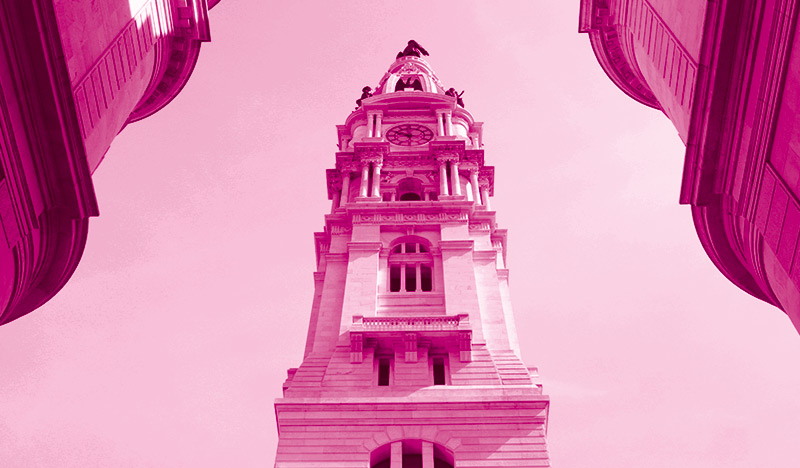Recently, in the pages of Philadelphia magazine, writer Simon Van-Zuylen Wood asked a compelling question: “Michael Nutter is about to leave the city younger, safer, bigger, and smarter than he found it—so why don’t we like him?”

It’s a question Nutter himself has grappled with—happily concluding, and touting, that he’s been the best mayor since, well, ever. This week, the Mayor released a self-funded poll that found Philadelphians were remarkably upbeat about his performance. And in the pages of the Inquirer recently Nutter argued that, “in virtually every category, we are up where you want to be going up and we are going down where want to be going down,” citing increases in population, employment and bond ratings and decreases in murder, crime and wage taxes.
Add to that the cessation of the perp walk parade out of his predecessor’s City Hall and it makes for a seemingly convincing case…so much so that it made me think long and hard about my own disappointment in Nutter. I’m on record as a one-time Nutter supporter who, like so many others, feels the mayor let slip away opportunity after opportunity to remake the city.
In light of the record Nutter is highlighting, am I wrong to fee that, ultimately, we got a technocrat more inclined to kick pressing problems down the road, rather than a transformational figure willing to take on stubborn and systemic challenges?
Nutter makes the argument that one-time supporters like me had outsized expectations in 2007. Maybe that’s true. But I can’t help feeling that Michael Nutter was an incrementalist when our situation called for more dire change—which would have required political skills he never possessed. It’s an important discussion to have now, because we’re a little over three months (yikes) away from once again not asking the right questions of those seeking the same job.
When Michael Nutter became mayor, he inherited the highest big-city tax burden, poverty rate, and digital divide percentage in the nation—not to mention the most screwed up school system, too. When he leaves office,
he’ll be leaving behind the highest big-city tax burden, poverty rate, and digital divide percentage in the nation—not to mention the most screwed up school system, too. (And let’s clear up one convenient argument often trotted out during the Nutter autopsy debate: the worst economic downturn since the Great Depression did not force Nutter to rethink his priorities and policies, as it occurred nine months into his administration, after he had already proposed an old-school, non-reformist budget that increased spending by 3.2%).
Yes, Commissioner Ramsey was a helluva hire and Nutter’s sustainability program is laudable and his government has been basically honest…but he didn’t try to do the hard stuff, despite having the political capital to change our city and our politics.
This dawned on me a couple of weeks ago. I’d read the Philly Mag piece and was wondering if I’d been too hard on Nutter. But then I watched Andrew Cuomo’s eulogy of his father, former New York Governor Mario Cuomo, and—that same week—I watched Jerry Brown’s political jujitsu moves in California, and I realized that we don’t have to look far for political leaders willing to take on seemingly intractable problems.
In his eulogy, Andrew Cuomo talked about the time he told his father he liked to look at his audience while delivering a speech, the better to gauge reaction. “He said that was all unnecessary,” Cuomo said. “He said, ‘Who cares about what the audience wants to hear? It’s not about what they want to hear, it’s about what you need to say.’ And that, my friends, is the essence of Mario Cuomo. He was not interested in pleasing the audience—not in a speech, not in life. He believed what he believed.”
“When Michael Nutter became mayor, he inherited the highest big-city tax burden, poverty rate, and digital divide percentage in the nation—not to mention the most screwed up school system, too. When he leaves office, he’ll be leaving behind the highest big-city tax burden, poverty rate, and digital divide percentage in the nation—not to mention the most screwed up school system, too.”
Hearing this, I flashed back on my time in grad school at NYU in the late eighties, during the senior Cuomo’s reign. Each year, public opinion polls would show that 70 percent of the electorate favored reinstituting the death penalty. And every year Cuomo would go on a statewide campaign, arguing against majority opinion.
I still remember the passionate case he made—and I wasn’t even registered to vote in New York: He’d talk about how capital punishment was really “an instruction in killing,” and he pointed out that the states that had it—like Texas—were the ones leading the nation in murder. Each year, he’d turn public opinion his way; each year, the legislature would fail in its attempt to bring back the death penalty.
It was politics as the art of persuasion. It was the spending of political capital for a principle passionately held. And that was why—twenty years after his public service—New Yorkers waited in the freezing rain to say goodbye to a governor they threw out of office in 1994: Because they knew that here was a man of conviction. Even if they disagreed with what he stood for.
Out on the left coast, Jerry Brown—at 76, just six years Mario Cuomo’s junior—persuaded Californians to raise taxes on themselves, with the proceeds dedicated to education. The onetime liberal has governed from the center, but dynamically and passionately, committed to doing big things. A couple of weeks ago, he convened a photo-op in Fresno, the eventual site of his biggest gambit yet, a $67 billion bet on high-speed rail between Los Angeles and San Francisco that has his opponents in an uproar.
But, like Cuomo taking on the pro-death penalty crowd, he made the case. He argued that the California economy generates over $2 trillion a year, making this investment a drop in the bucket. Plus, it’s environmental—“you can only have so many lanes; you can’t keep paving over prime agricultural land”—and consumer-friendly: “There’s no anti-texting rules on trains…you can use your iPhone and enjoy it. And you can have a martini or whatever you people drink.”
Brown took on what he called the “naysayers.” “Critique is the engine of the academy, of the newspaper industry, and a lot of our American culture. We need to be critiqued. Whatever the hell that word means. I don’t know why they don’t just say criticized. It sounds better. But we listen, and we change, and we modify. But we still can build.”
Then he got a sly smile on his face. “People do get pusillanimous,” he said. “I wanted to use that word because that’s the adjective I’m going to affix to all the critics. You can look it up on your cellphone right now. Pusillanimous. It means weak of spirit. The Golden Gate Bridge, that was attacked. BART (the Bay Area Rapid Transit system)—the mayor of Berkeley said this thing was a complete boondoggle.”
And, lest you think I’m being partisan by holding up two D’s as charter members of the anti-pusillanimous party, I’m convinced it’s why Americans loved Ronald Reagan so. Public opinion polls showed that the majority of Americans disagreed with his policies. But you never got the sense that Reagan’s finger was set to the wind. He had a philosophy that he’d make his case for, in that folksy way of his. He was seen as an authentic leader with core convictions.
Here’s the critical caveat: Leaders like Cuomo, Brown and Reagan were practiced, pragmatic politicians. They knew how to manage and bend large bureaucracies and they made deals in service of their ideals. They were proof that being principled and political were not mutually exclusive traits.
So what does this have to do with Michael Nutter, and the discussion we’re having about the next occupant of City Hall? In Nutter, we got a mayor with no clear, bedrock conviction—quick: What does Michael Nutter stand for?—and a politician with a holier-than-thou disdain for practicing politics. To borrow the famous Cuomo phrase, Nutter was a master of neither the poetry nor prose of politics.
I’m convinced it’s why Americans loved Ronald Reagan so. Public opinion polls showed that the majority of Americans disagreed with his policies. But you never got the sense that Reagan’s finger was set to the wind. He had a philosophy that he’d make his case for, in that folksy way of his.
Enough with the politicians who can’t do politics. Nutter, Kathleen Kane, maybe Tom Wolf…if we keep electing people who haven’t exhibited a talent for building coalitions and persuading others into action, we get the reactive, incremental leadership we deserve. (The same argument can be made on the national stage, where President Obama, another politician who holds his nose when it comes to doing politics, seems able to only get things done by executive decree.)
We think of ourselves as this tough-ass town, but it’s a self-aggrandizing myth. Pusillanimous leadership has actually been our great curse. A non-pusillanimous Michael Nutter might have said to the state, “Screw it. We’ll solve our own problems,” and taken back control of our schools.
Or he might have borrowed from the policies of his 2007 opponent Chaka Fattah, who wanted to sell off city assets like PGW and the airport to combat our rising poverty rate. (“Right issue, wrong messenger,” Nutter told me of his rival’s plan after Nutter beat Fattah in the 2007 primary).
Or he might have waged a public campaign to convince us that our unfunded pension liability is a real crisis that requires some tough choices. Or, given that City Council fought him every step of the way from the get-go—despite the fact that he had served on that august body—he might have spent some political capital and real dollars from his war chest and ran a mayoral slate of Council candidates in 2011.
He did none of that, at a time when he had every opportunity to rethink the nature of our policies and politics. That is why Michael Nutter was, at best, merely a serviceable mayor when we needed a great one.
And what of the next mayor? Who among our current candidates can politically get stuff done? Who among them share the pusillanimous curse? Check back here. We’ll be evaluating each of the current crop in terms of their political skills with our (only partly) tongue-in-cheek Pusillanimous Meter—a wholly subjective feature that grades our candidates on the degree to which they lack courage or determination.


